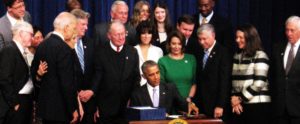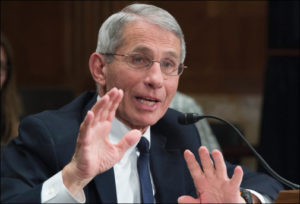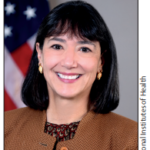Category: NIH
Grants under threat at the US National Institutes of Health
 Volume 406, Issue 10522
Volume 406, Issue 10522
20 December 2025
WORLD REPORT Changes to how research grants are assessed and awarded are undermining the world’s largest public funder of biomedical research. Washington Correspondent Susan Jaffe reports.
Robert Kennedy Jr’s Promises
 Volume 405, Issue 10480
Volume 405, Issue 10480
1 March 2025
WORLD REPORT To earn enough Senate votes for confirmation as Secretary of the US Department of Health and Human Services (HHS), Robert F Kennedy Jr made some surprising promises for someone aspiring to become the nation’s top health official. He had to reassure a few sceptical Republican senators that he would not overturn years of accepted public health policies, medical practice, and scientific consensus. And yet, in just the short time since assuming his new post on Feb 13, Kennedy’s actions—and inaction—appear to undermine those commitments as thousands of HHS employees are laid off under President Donald Trump’s executive orders shrinking the size and cost of government. [Continued here.]
…
Trump agenda ignites legal challenges
 Volume 405, Issue 10477
Volume 405, Issue 10477
8 February 2025
WORLD REPORT After just 3 weeks in the White House, US President Donald Trump’s executive orders have caused chaos and concern—and now, resistance. Susan Jaffe reports from Washington, DC.
“There’s nothing unusual about an executive order”, said Professor Emeritus Laurence Tribe, an expert in constitutional law at Harvard Law School. “What is unusual is for the President of the United States to say, ‘I can do anything I want, as long as I package it in an executive order. I can exercise not only the power to enforce the laws, which is basically what the executive branch does, but also the power to ignore law.’ ” Lawsuits have been filed to block executive orders affecting federal funding, workforce protections, closing the US Agency for International Development, and information on government websites including the Center for Disease Control and Prevention.[Full article here, includes links to updates on legal actions and executive orders.]
…
Volume 403, Issue 10427 ♦ 17 February 2024
PROFILE Dr. Monica Bertagnolli, Director of the National Institutes of Health
“I imagine a health-care system where clinical decisions are informed in real time by current research data,” the new National Institutes of Health director tells The Lancet. “And one where patients have the opportunity to both contribute their data for research and get back research results so that they can experience the best that science has to offer.” [Susan Jaffe reports here.]…
Biden’s science adviser resigns over bullying
 Volume 399, Issue 10326
Volume 399, Issue 10326
19 February 2022
WORLD REPORT Experts say that Eric Lander’s resignation should not affect the President’s plans to reboot the cancer moonshot project. Susan Jaffe reports.…
$6·5 billion proposed for new US health research agency
Volume 397, Issue 10288
22 May 2021
WORLD REPORT The Advanced Research Projects Agency for Health would fund high-risk, high-reward medical research, but its short-term planning could stymie basic research. Susan Jaffe reports.
During his first address to a joint session of Congress last month, US President Joe Biden drew little applause from Republicans in the physically distanced, masked audience. A rare exception to their steadfast silence came when he unveiled an ambitious plan to eradicate cancer.
To help reach this goal, Biden would establish a new biomedical research agency within the National Institutes of Health (NIH) called the Advanced Research Projects Agency for Health (ARPA-H). The agency would provide a fast track for transforming basic science into real-world applications. [Continued here.]
…
US election 2020: research and health institutions

Volume 396, Number 10259
24 October 2020
WORLD REPORT How will the NIH, CDC, and FDA change if President Donald Trump wins a second term or if his Democratic challenger, Joe Biden, defeats him? Susan Jaffe reports from Washington, DC.
Whoever wins the presidency needs to “restore the CDC and improve it by letting [scientists] know that they will have an opportunity to do the best science and make the best recommendations…” says James Curran, dean of the Rollins School of Public Health at Emory University in Atlanta. [Continued here.]…
State Says Hospitals Must Allow Support Person at Births
FAMILIES | THE CITY | March 28, 2020
The state Department of Health has toughened up its message to hospitals that have been telling pregnant women they can’t bring a partner or other support person into the delivery room because of coronavirus concerns. The new visitation policy’s boldface wording, issued late Friday, appears to leave little open to interpretation.
It “requires hospitals to allow one support person in labor and delivery settings if the patient so desires and two designated support persons in pediatric settings, provided that only one is present at a time.”
…The update reverses visitor bans announced earlier this week by New York-Presbyterian and Mount Sinai Health System in response to the coronavirus crisis. Other hospital systems had been expected to adopt similar procedures. [continued here]
…Decisions to be made on US gun violence research funds
 Volume 395 Number 10222 8 February 2020
Volume 395 Number 10222 8 February 2020
WORLD REPORT The National Institutes of Health and the Centers for Disease Control and Prevention will decide how to spend new federal funds later this year. Susan Jaffe reports from Washington, DC.
After a hiatus of more than two decades, Congress and President Donald Trump agreed to add funding for gun violence research to the federal budget in December. With grants expected to be awarded in September, the priorities for research and its potential impact are crucial for halting the US’s record-breaking gun-related death toll. [Continued here.]
…Trump administration limits fetal tissue research
 Volume 393 Number 10189 15 June 2019
Volume 393 Number 10189 15 June 2019
WORLD REPORT The move could threaten medical research advances, say scientists, as acquisition of new fetal tissue for research is substantially hindered. Susan Jaffe reports.
“Many discoveries now in clinical practice and wide research use have come from human fetal tissue”, said Irving Weissman, director of the Stanford Institute for Stem Cell Biology and Regenerative Medicine. “For these, there was—and still is—no substitute for human fetal tissue.”
…Anti-abortion groups praised the new policy, which would “separate federal research funding from the abortion industry”, said Melanie Israel, a research associate at the conservative Heritage Foundation… Yet how the new Trump research policy would reduce abortions is still unclear. “They are conflating pro-life issues and abortion with research”, said Jennifer Zeitzer, public affairs director at the Federation of American Societies for Experimental Biology. “But there’s no evidence that women are getting abortions so they can donate fetal tissue for research.” [Continued here.] …
USA sets goal to end the HIV epidemic in a decade
 Volume 393, Number 10172
Volume 393, Number 10172
16 February 2019
WORLD REPORT The unexpected announcement in the State of the Union address could set the start of a realistic agenda to end HIV/AIDS in the USA, provided funds are secured. Susan Jaffe reports.
Nearly an hour into his 90 min State of the Union address, President Donald Trump called for a government-run health-care programme “to eliminate the HIV epidemic in the United States within 10 years”.
Although the president has promised to get rid of the Affordable Care Act (ACA) along with its health insurance marketplaces and Medicaid expansion, these and other policies did not appear to dampen his enthusiasm. [Continued here.]…
Gun violence research in the USA: the CDC’s impasse
 Volume 391, Number 10139
Volume 391, Number 10139
23 June 2018
WORLD REPORT Months after the Trump Administration said that there is no ban on gun violence studies, the CDC still lacks the funding to proceed. Susan Jaffe, The Lancet‘s Washington correspondent, reports.
…Appeals for immediate federal action to make schools and communities safer have so far largely gone unanswered. And legislative efforts languish in Congress, as the chairman of a key congressional committee that oversees federal health programmes has so far resisted requests by its Democratic members to hold hearings on preventing gun violence [continued here].…
After a weekend of negotiations and demonstrations, shutdown disrupts health agencies
Susan Jaffe | Washington Correspondent for The Lancet | 22nd January 2018
![]() On the first anniversary of Donald Trump’s inauguration as the 45th
On the first anniversary of Donald Trump’s inauguration as the 45th  president of the United States on January 20, 2018, the federal government ground to a shutdown and hundreds of thousands of women and their supporters rallied against the new president in dozens of cities across the country. [Continued here.]
president of the United States on January 20, 2018, the federal government ground to a shutdown and hundreds of thousands of women and their supporters rallied against the new president in dozens of cities across the country. [Continued here.]
…
High stakes for research in US 2018 budget negotiations
 Volume 390, Number 10099
Volume 390, Number 10099
9 September 2017
WORLD REPORT As Congress considers how to fund the government next year, scientists hope spending for research will not be curtailed. Susan Jaffe, The Lancet’s Washington correspondent, reports.
The dramatic defeat of the Republicans’ Affordable Care Act (ACA) repeal legislation still looms over the US Capitol as Congress reconvenes this month for more tough decisions, including many that will affect health and science research programmes. …The prospects for science funding will depend on competing budget pressures and political fissures. “There are a lot of moving parts and a lot of uncertainty”, said Matt Hourihan, at the American Association for the Advancement of Science. “And while a spending deal [agreement] is certainly possible, it’s hard to see how they get there from here.” [Continued here]…
Science appointments in the USA
 Volume 389, Number 10088
Volume 389, Number 10088
24 June 2017
WORLD REPORT Slow appointments and vacant positions in federal agencies challenge the stability of research in the USA. Susan Jaffe, The Lancet’s Washington correspondent, reports.
As President Donald Trump rolls out his domestic agenda, his proposed budget cuts and lingering vacancies in key federal agencies have rattled some people in the biomedical research and science community.
“This has been the most anxious time in science that I have seen in this country”, said Rush Holt, chief operating officer at the American Association for the Advancement of Science (AAAS), which represents 250 scientific societies and academies serving 10 million members. Holt cited a litany of reasons: “fake news” that distorts science, “policy making based on wishful thinking rather than evidence, funding proposals that are nonsensical, and unfilled positions in government agencies”. [Continued here]
…
Marching for science as budget cuts threaten US research
 Volume 389, Number 10080
Volume 389, Number 10080
29 April 2017
WORLD REPORT Americans push back against President Trump’s proposed budget cuts… Susan Jaffe, The Lancet’s Washington correspondent, reports.
President Donald Trump is famous for his early morning Tweets and off-the-cuff remarks that can sometimes be puzzling. But what he thinks about biomedical research and basic science is quite clear in his first proposed budget for running the federal government.

March for Science, Washington, D.C. / Susan Jaffe
Trump’s America First: A Budget Blueprint to Make America Great Again outlines a $1·1 trillion spending plan that would take effect when the new fiscal year begins in October. The president wants to move $54 billion from domestic agencies to fortify the US military. To help pay for the transfer, he is proposing funding cuts for the US Environmental Protection Agency (EPA; 31%) and the National Institutes of Health (NIH; 18%) [and other domestic agencies]….
To squeeze $5·8 billion out of the agency’s $30·3 billion budget, the Trump administration would reorganise NIH’s 27 institutes and centres and “rebalance federal contributions to research funding” according to the budget blueprint. …Health and Human Services Secretary Tom Price told a congressional committee last month that the NIH could operate on a tighter budget by cutting the roughly 30% of grant money that pays for indirect research costs. These expenses can include rent, utilities, administrative staff, and equipment. “That money goes for something other than the research that’s being done”, Price said.
Price’s suggestion was especially disturbing coming from the person who is responsible for overseeing the NIH, said Harold Varmus, who directed the NIH in the 1990s and headed the National Cancer Institute at NIH for 5 years until 2015. “You can’t do research in the dark”, he said. “You can’t do research—at least my kind of research—without a building and without electricity and water and administrative expenses”. [Continued here]
…
Experts confident of congressional funding for US Cures Act
Volume 389, Number 10065
14 January 2017
How future funding for the landmark 21st Century Cures Act and repeal of the Affordable Care Act may affect its success. [Interviews with lead sponsors Representatives Fred Upton, Diana DeGette, NIH Director Francis Collins, and patient advocates. Full article here] …
Biomedical research bill becomes law, but critics raise concerns over long-term implementation
Susan Jaffe | Washington Correspondent for The Lancet | 14 December 2016
The 21st Century Cures Act that President Barack Obama signed into law this week dedicates – but doesn![]() ‘t guarantee – billions of dollars to accelerating the discovery of new drugs and medical devices and getting them to patents more quickly, as well as supporting opioid addiction treatment and reforms in mental health care.
‘t guarantee – billions of dollars to accelerating the discovery of new drugs and medical devices and getting them to patents more quickly, as well as supporting opioid addiction treatment and reforms in mental health care.

President Barack Obama signs the 21st Century Cures Act, Tuesday, Dec. 13, 2016. (Photo by Susan Jaffe)
The overwhelming support for the law marks a stark contrast from the Affordable Care Act, another landmark health reform bill Obama signed in the second year of his presidency. Republicans promise to repeal it as soon as the new Congress convenes next month and Donald Trump is sworn in as president. But before the promised elimination of the ACA, Congress took nearly $5 billion from its Prevention and Public Health Fund to pay for most of the law.[Continued here.]
…
US global health leadership hangs on election result
 Volume 388, Number 10055
Volume 388, Number 10055
22 October 2016
WORLD REPORT On most issues, the US presidential candidates have polar opposite views; engagement in global health is no different. Susan Jaffe, The Lancet’s Washington correspondent, reports.
Americans will choose their next president in less than 3 weeks and yet some global health experts still wonder what would happen to the international health programmes that the USA has championed in recent decades if the Republican contender, Donald Trump, is elected. The uncertainty comes despite the Ebola virus and Zika virus threats that made global health front-page news. [Continued here] …
US presidential candidates urged to support health research
 Volume 387, Number 10037
Volume 387, Number 10037
18 June 2016
WORLD REPORT Advocates for medical research are eager to hear how the presidential candidates would advance the search for new treatments. Susan Jaffe, The Lancet’s Washington correspondent, reports.
As the most tumultuous presidential primary season in recent times comes to an end, biomedical researchers, physicians, and advocacy groups want the candidates campaigning for the White House to address some of the substantive matters they worry about: National Institutes of Health (NIH) funding, advancing Alzheimer’s disease research, speeding up drug development, and a host of research related issues.
… In New Hampshire last year, the campaigns provided a preview of the kind of discussion between candidates and voters that research and patients’ advocacy groups would like. It revealed a stark difference between Clinton and Trump on funding for Alzheimer’s research and support for those caring for the 5·4 million Americans stricken with the disease. [Continued here]
…
US responds to increase in Zika cases
 Volume 387, Number 10030
Volume 387, Number 10030
30 April 2016
WORLD REPORT Health officials pursue Zika research and prepare to combat a formidable foe—the mosquito— despite uncertain funding. Susan Jaffe, The Lancet’s Washington correspondent, reports.

Anthony Fauci
As the number of confirmed cases of people who have contracted the Zika virus increases across the globe, the growing knowledge about this once rare infection is not reassuring. “The more we learn, the more we get concerned”, said Anthony Fauci, director of the National Institute of Allergy and Infectious Diseases….
Representative Tom Cole, the Oklahoma Republican who is chairman of the House appropriations health subcommittee, said its questions about [President Barack Obama’s $1.9 billion Zika emergency funding] request are not unreasonable….“Let us do our job to make sure we do this as prudently as possible and we will get there”, he said. “Nobody thinks this is not a serious challenge”….
While clinical research and the funding debate continues, protection from the Zika virus will depend largely on avoiding the mosquitoes that carry it….
After years of cuts in federal and local funding for mosquito control, Zika is “a pretty major wake up call to rebuild those capacities”, said Lyle Petersen, director of CDC’s division of vector-borne infectious diseases. The virus is the latest “major pathogen that has come into the Americas” in recent years—after chikungunya, dengue fever, and West Nile virus—“and it won’t be the last.” [continued here] [listen to podcast here] …
Zika response threatened by funding shortage
Congress hasn’t budged in the five weeks since President Barack Obama asked Congress for more than $1.8 billion in emergency funding to deal with the Zika virus. But Zika isn’t waiting.
In the weeks since the president’s request, the number of cases of the mosquito-borne virus among people who traveled to countries where transmission has been confirmed has almost quadrupled to 193, as of March 9. It is in nearly twice as many states — 32 and the District of Columbia — with Florida, New York and Texas topping the list. In Puerto Rico, the U. S. Virgin Islands, and American Samoa, the number of cases is 174, or 19 times higher, reports the US Centers for Disease Control and Prevention. [continued here] …
NIH hopes funding increases will continue
 Volume 387, Number 10019
Volume 387, Number 10019
13 February 2016
WORLD REPORT The US National Institutes of Health welcomed a record budget boost that might be the start of more sustained support. The Lancet’s Washington correspondent, Susan Jaffe, reports.
The US Congress recently approved the largest single increase in funding for the National Institutes of Health (NIH) in 12 years—a US$2 billion raise that was twice as much as President Barack Obama requested. But almost as soon as NIH supporters stopped cheering, they began to worry about next year’s budget, and the challenge of a new public health threat, Zika virus.
NIH Director Francis Collins told The Lancet that the funding boost “was enormously gratifying”. But if it is “a one-hit wonder”, he said “it won’t be sufficient to take full advantage of the remarkable scientific opportunities and talent that is out there”. [Continued here] [podcast here]
…
Congress Wrangles Over Funding for Zika Research
Susan Jaffe | Washington Correspondent for The Lancet | 12th February 2016
President Barack Obama asked Congress this week for more than $1.8 billion in emergency funding ![]() to respond to Zika virus and administration officials wasted no time in explaining why at four congressional hearings less than two days later.
to respond to Zika virus and administration officials wasted no time in explaining why at four congressional hearings less than two days later.
While such Capitol Hill visits are part of the budget process, the looming virus adds a new urgency to the proceedings–though not necessarily enough to deter controversy. [Continued here]…

